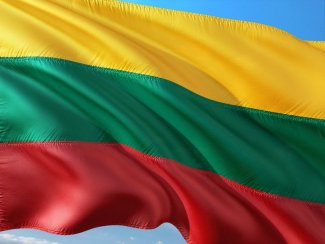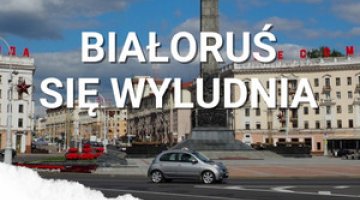Vilnius cancels Lukashenka. Lithuania’s policy on the Belarus crisis

The Lithuanian government has not recognised the legality of the election of Alyaksandr Lukashenka as President of the Republic of Belarus, and it now regards the opposition as their main partner. Lithuania has taken on the role of spokesperson for the opposition’s interests, a move which has put an end to Vilnius’s cooperation with the Belarusian dictator. Lithuania attaches particular importance to maintaining ties with Belarusian citizens, on the one hand by providing support to the victims of repression, and on the other by ensuring that social and economic contacts between the two countries are maintained.
Considering the delayed reactions from the West, regional cooperation with Poland, Latvia and Estonia – the countries that supported Lithuania’s proposal to impose individual sanctions against the dictator and his regime’s officials – will play a key role in Lithuania’s strategy concerning the crisis in Belarus. Through such cooperation, Lithuania is hoping to build a stronger alliance within the EU to call for new elections. At the same time, however, it opposes the imposition of international economic sanctions, as these would have a negative effect on the people of Belarus and undermine Lithuania’s economic interests.
Lithuania’s responses to the crisis
The mass demonstrations came as a surprise, and in response the Lithuanian government has adopted the tactic of reacting swiftly in support of the protesting Belarusians. Vilnius has given shelter to dozens of people persecuted by the Lukashenka regime, including Sviatlana Tsikhanouskaya, Lukashenka’s main rival in the elections. Tsikhanouskaya was described by the president and parliament of Lithuania (in a resolution of 10 September) as the leader chosen by the Belarusian people. Lithuanian politicians have legitimised her right to represent that part of Belarusian society that is demanding new elections and holding spontaneous industrial action.
Another form of support which Lithuania is offering involves making it easier for asylum seekers and those who fear for their own or their families’ lives to enter the country. These persons will have the right, for humanitarian reasons, to cross the border on the basis of permits from the Ministry of the Interior, and will be exempt from the obligation to comply with the general rules for preventing the spread of the coronavirus. Lithuania has also simplified the procedure for professionals (mainly expected to be Belarusian IT specialists) who want to move their businesses. It has also announced a doubling of financial support for Belarusian students studying at the European Humanities University (EHU) in Vilnius, which was transferred there from Minsk in 2005. Lithuania has also proposed that the European Commission should set up an EU support fund for the Belarusian opposition.
Lithuania has applied individual restrictions targeted directly at the interests of persons associated with the Lukashenka regime. The list published on 31 August included 32 names, including Lukashenka himself, his son Viktar, and members of the dictator’s administration and ministries of force; these people will not be allowed to enter Lithuania for a period of five years. President Gitanas Nausėda announced that the decision had been consulted with the Latvian and Estonian governments, who had included the same names on their own national sanctions lists. Vilnius has announced that the list will be expanded (the Lithuanian foreign ministry is seeking to include 118 people on it), but its overarching goal in the implementation of sanctions is to obtain the broadest possible international support for this form of pressure on the Lukashenka regime.
Another key element of Lithuania’s actions involves raising the Belarusian issue at the international level. President Nausėda and Linas Linkevičius (who has been foreign minister since 2012, and previously served as his country’s ambassador to Belarus) have been most active in this field and in the Western media. Lithuania’s activities abroad have been strengthened by its cooperation with the other countries of the region, which are also seeking to maintain international pressure on Minsk to stop the persecution of demonstrators and hold new elections. On 11 August the foreign ministers of Poland, Lithuania and Ukraine called on the Belarusian government to stop the use of force, as part of the Lublin Triangle initiative. President Nausėda presented a three-point plan to resolve the crisis (a halt to violence, the release of detainees, and the resumption of dialogue with civil society) after consultation with and support from the presidents of Poland, Latvia and Estonia. On 19 August an extraordinary meeting of the European Council concerning Belarus took place, at Lithuania’s initiative, during which the issue of EU sanctions was discussed.
Lithuania’s increasingly hostile eastern neighbourhood
In recent years, Lithuanian-Belarusian relations have been severely burdened by the issue of the Astravyets nuclear power plant near the border with Lithuania (the Lithuanian side considers it to be potentially dangerous). Now there is a second issue of principled importance for Vilnius – democratic elections in Belarus. Minsk rejected President Nausėda’s offer of mediation, and deployed additional military units at the border in response. Bilateral Lithuanian-Belarusian relations were already cool (diplomatic relations have been frozen, but economic cooperation has been maintained), but they have now moved into a state of deep crisis, with no prospect of a breakthrough as long as Lukashenka remains in power.
However, economic cooperation can still continue as long as Belarus remains a separate political entity, even if Lukashenka remains in power. Lithuania has never been in favour of economic sanctions against Belarus. Despite the two states’ disputes over the Astravyets nuclear power plant, in recent years economic cooperation between them has developed: in 2018 trade rose by 11%, and in 2019 Belarusian imports to Lithuania rose by about 2.4%, and Lithuanian exports to Belarus by about 6.4%.
Although Lukashenka has threatened to redirect Belarusian transit in response to Lithuania’s restrictions, Vilnius still expects the dictator’s future decisions to be pragmatic. One third of the cargo in the port of Klaipėda is made up of Belarusian goods, mainly fertilisers for export. Klaipėda also mediates the import and export of crude oil and oil products between Belarus and its Western partners. Redirecting transit would mean significantly higher costs for Belarus and reduce the competitiveness of its products. Lithuania therefore has reason to expect that, despite the hostility in political relations and the clear signal of the suspension of diplomatic relations with the Lukashenka regime, the two countries’ economic relations, and thus their business ties, will not come to a halt.
Relations between the two societies are close, despite the continuing disputes over the common history and heritage of the Grand Duchy of Lithuania. Belarusians often chose to migrate to Lithuania during the Soviet period, and they now make up the third largest minority (1.2%) in Lithuania (after Poles, who according to the Lithuanian Department of National Minorities make up 6.6% of the population, and Russians [5.8%]). Belarusians are also the second most common migrant nationality to Lithuania after Ukrainians: in 2018 Ukrainians accounted for 46.5% of immigrants, and Belarusians 26.4%. Social contacts are facilitated by the fact that the two nations are more familiar with post-Soviet reality, and can communicate in the Russian language. The EHU has hosted more than 2500 students during its 15 years of existence, 95% of whom have been Belarusian citizens. Lithuania has also supported the Belarusian opposition for years.
Vilnius’s involvement in the crisis in Belarus will re-inflame relations with Russia, which Lithuania sees as a hostile state working to undermine its interests and security. It also accuses Moscow of making the Belarusian economy dependent on Russia’s, of providing support to Lukashenka’s regime against the will of the public, and of seeking to annex the country. This assessment was reflected in the resolution adopted on 10 September by the Lithuanian Parliament “on the illegal Russian union imposed on Belarus”. The deputies called on the Russian government not to interfere in Belarus’s domestic and foreign policy. They also asked the international community to recognise any possible agreement on the deeper integration of the two countries as a crime against the Belarusian people and an annexation of Belarus.
Russia sees Lithuania’s involvement on the side of the protesters as meddling in Belarus’ internal affairs. The Lithuanian government has played down Lukashenka’s statements about the military threat from NATO countries, and sent a message to Russia that the political consequences of its possible military support for Belarus would be detrimental to Moscow.
Domestic divisions in Lithuania on the situation in Belarus
Despite Lithuania’s consistent position on the crisis in Belarus, there are domestic political differences on how it should approach cooperation with its neighbour. Parliamentary elections will be held in Lithuania on 11 October; the campaign has mainly focused on domestic issues, but the political community’s reaction to the events in Belarus has also become part of the discussion.
In view of the upcoming elections, the Lithuanian parliament has been particularly active in the face of the Belarusian crisis. On 2 September, deputies from various groups created a delegation for Belarusian affairs (led by the Social Democratic deputy Gediminas Kirkilas), which is ready to travel to Belarus as soon as possible, that is after democratic transformations take place in the country. In recent weeks, the Lithuanian parliament has adopted two resolutions in support of the opposition and its leader, Sviatlana Tsikhanouskaya. Their unambiguous nature has clearly determined that a return to cooperation with Lukashenka will not be possible. These were initiated by a group of conservatives in cooperation with the Social Democratic foreign minister Linas Linkevičius. The right-wing conservative opposition (which is leading in pre-election polls, but whose advantage over the ruling Union of Peasants and Greens [LVŽS] is not large) has criticised the government, with the exception of the foreign minister, for being too limited in its action against Belarus and issuing too short a list of sanctioned persons. This is also an expression of dissatisfaction with the work of the interior minister Rita Tamašunienė, who represents the Electoral Action of Poles in Lithuania – Christian Families Alliance (EAPL–CFA / AWPL–ZCHR (pl.), LLRA–KŠS (lit.)) in the government (the Polish minority party is still in conflict with the conservatives). Her ministry limited the list to 32 names, although the possibility of expanding it has been left open, especially (as the government most strongly anticipates) in cooperation with the other countries in the region and the Western allies.
The conservatives – together with the liberals, including the newly formed Freedom Party – have adopted the most principled position: while refusing any possibility of maintaining cooperation with the Belarusian authorities, they are nevertheless demanding – despite the risks this would pose to economic relations – that the regime closes the power plant in Astravyets, releases political prisoners and conducts democratic elections. A similar position has been taken by the LVŽS as it competes with the conservatives; it has also declared – probably out of fear of possible criticism from the right-wing opposition – that it does not intend to cooperate with Minsk until the international community recognises the outcome of democratic elections in Belarus. The party believes that Lithuania’s capacity to act against Belarus is limited, and has mainly called for support to be offered to the repressed.
The most critical position on the attitude of the Lithuanian right has been adopted by the Electoral Action of Poles in Lithuania – Christian Families Alliance. The Polish group did not support the parliament’s resolution of 10 September, considering it to be part of the right’s election campaign, and not an initiative which would genuinely contribute to change in the situation in Belarus. According to its leader Valdemar Tomaševski (Waldemar Tomaszewski), Lithuanian politicians are ignoring Lukashenka’s continued popularity in the provinces. The Polish party has advocated social dialogue instead of the public resolutions issued by the parliament. Most other groups are calling for continued cooperation with Belarus within the framework of neighbourly relations; however, they emphasise that this cannot happen at the cost of violations of human rights and democratic principles.
Lithuania’s cooperation with the dictator: more negatives than positives
In the past, Lukashenka has repeatedly called upon political and economic support from Vilnius when his country’s disputes with Russia have become more serious. Lithuania has seen his signals of openness to contacts and cooperation as a desire to pursue a policy that was slightly more independent of Moscow – something which Lithuania wanted to support, especially in the areas of economic and energy cooperation. The construction of the power plant in Astravyets, which will keep Belarus’s economy’s dependent on Russia, has become a symbol of the failure of Lithuania’s expectations towards Lukashenka. His search for support in Moscow to maintain his hold on power, despite the mass social protests, will inevitably bring about the Lithuanian government’s final withdrawal from the policy of maintaining contacts and cooperation with the dictator. Vilnius’s breaking off relations with Lukashenka is mainly determined by the need to oppose human rights violations. If it did not insist on their observance, Lithuania would become less credible as an intermediary in the EU’s relations with Belarus, and as a country supporting the latter’s process of democratisation.
Lithuania is currently seeking to compensate for its failure in its relations with Lukashenka by providing activity and assistance to the Belarusian opposition, which is becoming its new partner in bilateral relations. Meanwhile, Vilnius is becoming its main international spokesman (next to Poland).
An additional political advantage for Lithuania in representing the interests of the protesting Belarusians lies in the consolidation of other countries in the region around this issue – Poland, Latvia, Estonia and Ukraine. Cooperation is also deepening with Western partners (such as Germany) who are interested in achieving democratic transition in Belarus, and in Lithuania’s intermediary role in providing the West with knowledge about the processes taking place in the country. By forming a broader coalition around the Belarusian issue, Lithuania can also more effectively persuade those allied countries which want to maintain cooperation with Lukashenka-supporting Russia to change their positions. President Emmanuel Macron’s visit to Vilnius on 28-29 September will provide an opportunity to achieve this. One test of how effective the regional cooperation Lithuania has initiated is will be whether it can convince Western countries to take joint decisions to put more pressure on Lukashenka and his closest associates.




